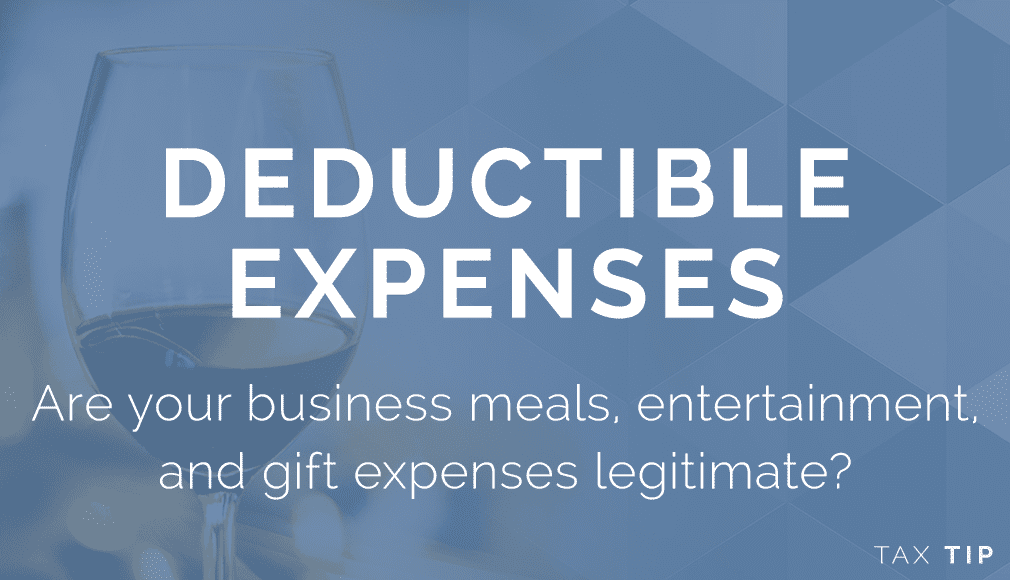
Entertainment, meals, and gift expenses have become common expenditures in the business world. These expenditures can build strong relationships with both ongoing and prospective clients. Make sure your expenses are legitimate and that you have the proper records. This is one of the areas the IRS has decided to look at more closely, which means many taxpayers may receive the unpleasant news that they have been selected for audit.
Entertainment includes any activity that provides entertainment, amusement, or recreation, and includes any meals provided to the customer or prospect. There are several tests and criteria that must be met in order for these expenses to be deductible. First, the expenses must be ordinary and necessary. This means that it is customary or usual in a taxpayer’s particular industry and it is appropriate and helpful for developing a taxpayer’s business. If this requirement is satisfied, the expense must also pass either the directly-related test or the associated test.
The directly-related test requires that the entertainment took place in a clear business setting, or the main purpose of entertainment was the active conduct of business and you did engage in business with the person during the entertainment, and you had more than a general expectation of getting income or some other specific business benefit. A cocktail reception at a convention center where you are displaying your products or information about your services is a clear business setting.
Entertainment expenses aren’t considered directly related if there are substantial distractions that generally prevent the active conduct of business. An example would be a sporting event or a concert. Just because the expense isn’t directly related doesn’t mean it wouldn’t qualify for the associated test. Under this test, the expenses must be associated with the active conduct of your business and be directly before or after a substantial business discussion.
Taking a client out to lunch and letting him know that you appreciate his business is encouraging the continuation of an existing business relationship, so it is associated with your business. A substantial business discussion depends upon the facts of each case, but you must show that you actively engaged in the discussion in order to derive some specific business benefit. Asking the client how his business is going and what challenges he is currently facing in order to promote additional services you might offer, or describing your new products or services would be a substantial business discussion. The discussion doesn’t need to occur during the entertainment, but it does need to be directly before or after the entertainment. If the discussion and entertainment happen on the same day, it satisfies this requirement.
It is important to note that only 50% of entertainment expenses are deductible, but this can still be a significant deduction for many taxpayers.
Business gifts may also be deductible, but there is a $25 limit per gift. If you send a $75 gift basket to a customer to thank her for her business, you may only deduct $25. Items costing $4 or less with your business name imprinted on them aren’t considered gifts. These are identical items that you widely distribute like pens or key chains. If you give a customer tickets to an event and you don’t go with him, you have a choice. You can treat the tickets as either a gift or entertainment, whichever is to your advantage.
If you keep accurate records, you will have evidence to show the IRS if your expense deduction is ever challenged. Your records for entertainment must show the cost, date, location, and business purpose of each expense. You must also include the business discussion or activity along with a description of those whom you entertained (such as names, occupations, or titles). You must also prove that you were present if the entertainment was a business meal.
A recent court case denied meal expenses for a stockbroker who frequently met with clients during lunches or dinners. She entered 100 receipts into evidence which did show the amount, date, location, and names of those entertained. The business purpose of the meetings, however, was not included, and the Tax Court denied the deductions which cost her almost $10,000.
Don’t let yourself get into this situation. Many of your business expenses are legitimate and should rightfully be deductions on your tax return. Make sure you account for them properly as they occur. Talk to your CPA if you have specific questions about your business transactions.
Contact us for guidance and application to your individual situation →

Associate Partner
Julie has over 20 years of experience in public and private accounting, representing varied clientele including the medical, legal, and real estate industries and trusts.
View Julie's Bio →